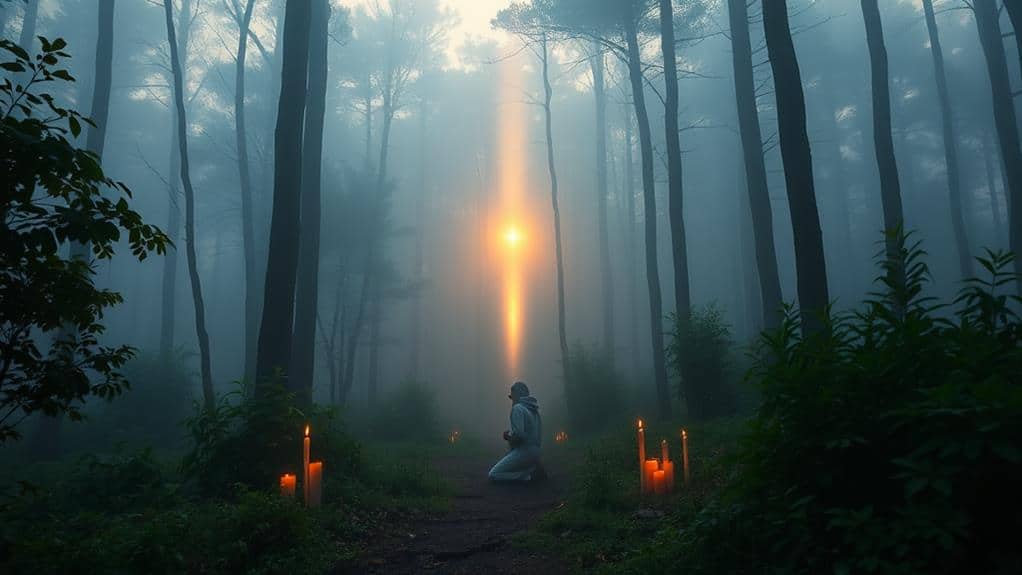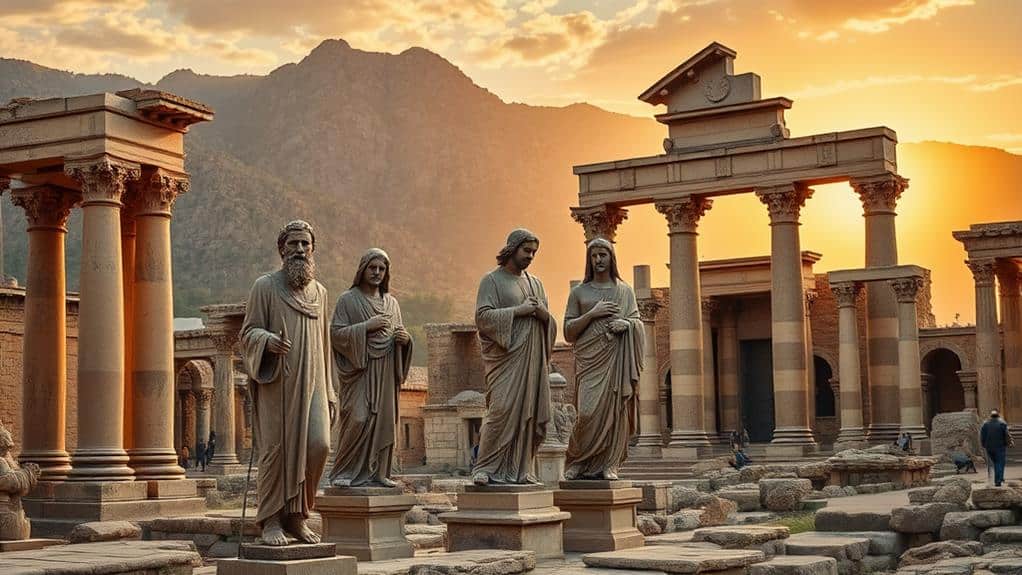We find in Jacob's transformative night, as recounted in Genesis 32:22-32, a pivotal moment in biblical narrative where intense physical and spiritual wrestling with a mysterious opponent yields a profound rebirth, renaming, and redefinition of his relationship with the divine. This encounter, marked by struggle and vulnerability, signifies a shift from self-reliance to dependence on God, forging a new identity for Jacob. As we explore the rich symbolism and theological implications of this narrative, we begin to uncover the complexities of divine-human relationships and the transformative power of encounters with the divine, inviting us to further exploration.
Key Takeaways
- Jacob's transformative night at Jabbok involves a physical and spiritual wrestling match that symbolizes a clash of willpower and strength.
- The encounter marks a pivotal moment in Jacob's life, leading to profound transformation and a new identity as Israel.
- The identity of Jacob's opponent remains ambiguous, allowing diverse interpretations across Christian, Jewish, and Islamic traditions.
- Jacob's transformation serves as a paradigm for spiritual growth, highlighting the importance of vulnerability, surrender, and dependence on God.
- The narrative has inspired artistic expression and literary imagination throughout history, representing the universal human quest for spiritual growth and transformation.
Jacob's Midnight Encounter at Jabbok
Transformation often unfolds in the darkest moments, as epitomized by Jacob's midnight encounter at Jabbok. We find ourselves drawn to this pivotal narrative in Genesis 32:22-32, where Jacob's struggle dynamics are on full display.
The physical and spiritual wrestling that ensues is a clash of willpower and strength, leaving Jacob limping and forever changed. As we explore this encounter, we discover that the struggle isn't merely physical, but also a spiritual wrestling that represents a transformation and rebirth.
Jacob's name change to Israel signifies a new identity, one forged in the crucible of struggle with God. Through this narrative, we gain insight into the human condition, where vulnerability and transformation are inextricably linked, and the face of God is revealed in the most unexpected moments.
The Mystery of Jacob's Opponent
As we explore the enigmatic narrative of Jacob's wrestling match, we find ourselves confronted with a profound question: who was Jacob's mysterious opponent? The identity of this figure has been a topic of debate among scholars and theologians for centuries.
We can consider several perspectives on the opponent's identity:
- The biblical text leaves the opponent's identity ambiguous, allowing for various interpretations.
- Christian traditions often view the opponent as a divine manifestation or a pre-incarnation appearance of Christ.
- Jewish interpretations suggest the opponent was an angel or the guardian angel of Esau.
- Islamic perspectives note the absence of this story in the Quran, leaving the identity ambiguous.
- The textual ambiguity allows for multiple perspectives across religious traditions, enriching our understanding of the narrative and inviting us to ponder the nature of divine encounters.
Symbolism of the Limp and Penuel
The wounded Jacob emerges from his midnight encounter at the Jabbok River with a tangible reminder of the struggle: a limp. This physical manifestation serves as a potent symbol, inviting us to ponder the deeper significance of his transformative experience.
The limp symbolism underscores Jacob's vulnerability, while also testifying to his unyielding spirit. Furthermore, the name Penuel, meaning "Face of God," underscores the profound intimacy of the encounter.
As we grapple with the limp's significance, we're reminded that spiritual growth often requires surrender and vulnerability. Jacob's experience at Penuel serves as a powerful reminder of the enduring impact of divine encounters, compelling us to reexamine our own spiritual journeys in light of this pivotal narrative.
Through the limp, we're drawn into the complex interplay between human fallibility and divine revelation.
Christian Perspectives on Jacob's Opponent
In exploring Christian perspectives on Jacob's opponent, we find a diverse range of interpretations that have evolved over time. Christians have long debated the identity of Jacob's mysterious adversary, with some viewing it as a divine being, and others as a pre-incarnation appearance of Christ. The biblical account in Genesis 32:22-32 leaves the opponent's identity ambiguous, allowing for various theological implications.
- The divine identity of Jacob's opponent raises questions about the nature of God's interactions with humanity.
- Some Christian interpretations see the opponent as a manifestation of God's power and authority.
- Others view the encounter as a test of Jacob's faith and character.
- The theological implications of this encounter are profound, highlighting the complexities of divine-human relationships.
- Ultimately, the mystery of Jacob's opponent invites us to ponder the depths of God's nature and our place within the divine plan.
Jacob's Transformation and New Identity
Following Jacob's intense wrestling encounter, we witness a pivotal moment in his life, marking a profound transformation and the emergence of a new identity.
As we examine this critical juncture, it becomes clear that Jacob's struggle has been transformed, yielding a redefined sense of purpose and self. His new name, Israel, signifies a rebirth, symbolizing the transformative power of his divine encounter.
We observe that Jacob's identity is redefined, as he moves from a state of self-reliance to one of dependence on God. This struggle transformed his understanding of himself and his relationship with the divine, illuminating the complex interplay between human agency and divine intervention.
Ultimately, Jacob's transformation serves as a paradigm for understanding the human experience of spiritual growth and transformation.
Cultural Impact of the Wrestling Match
Jacob's wrestling match has left an indelible mark on the canvas of human creativity, as brushstrokes of artistic expression and literary imagination have brought this biblical narrative to life.
We find ourselves reflecting on the profound impact of this story on our cultural landscape. The wrestling match has inspired countless masterpieces, from music and art to literature, that reflect the emotional and spiritual depth of this encounter.
- The narrative's rich symbolism represents the struggle between humanity and the divine.
- Cultural interpretations of the wrestling match vary across religious traditions, enriching our understanding of the narrative.
- Artistic influences can be seen in works that depict themes of love, sacrifice, and redemption.
- The story invites contemplation on personal spiritual journeys and divine intervention.
- Historical context reveals the narrative's enduring legacy in cultural expressions.
Artistic Depictions Through the Ages
The intersection of art and theology finds a profound expression in the numerous depictions of Jacob's wrestling match across the centuries.
As we explore the various artistic interpretations of this pivotal biblical narrative, we notice a rich mosaic of historical influences woven into the fabric of each piece. From Renaissance paintings to modern sculptures, the wrestling match has been reimagined in diverse mediums, reflecting the cultural and theological contexts of their time.
We see Jacob's struggle with the divine embodied in dramatic lighting, intense facial expressions, and dynamic compositions, each conveying the transformative power of the encounter.
Historical Context of the Narrative
Ancient biblical narratives often engage with the complexities of human experience, weaving historical context and theological themes into a rich fabric of storytelling. As we explore the historical context of Jacob's wrestling narrative, we uncover a profound intersection of human struggle and divine encounter.
- The story originates from biblical narratives in Genesis, reflecting themes relevant to different historical periods and influencing both religious and secular art movements.
- The narrative's historical significance lies in its ability to transcend cultural boundaries, speaking to universal human experiences of struggle and redemption.
- The cultural relevance of Jacob's story is evident in its enduring impact on art, literature, and music throughout history.
- The story's influence can be seen in various portrayals of biblical figures and events in film and theater.
- By examining the historical context, we gain a deeper understanding of the narrative's transformative power and its continued resonance in contemporary culture.
Striving With Divine Forces
As we explore the heart of Jacob's wrestling narrative, contending with divine forces emerges as a pivotal theme that not only underpins the biblical account but also speaks to our deepest human aspirations and struggles.
Through Jacob's encounter with the mysterious figure at the Jabbok River, we witness a divine struggle that embodies the universal human quest for spiritual growth and transformation.
This narrative thread underscores the idea that our most profound growth often arises from our darkest struggles. As we grapple with the divine, we're forced to confront our own limitations and vulnerabilities, leading to a deeper understanding of ourselves and our place within the larger cosmic landscape.
In this sense, Jacob's story serves as a powerful reminder of the transformative potential of contending with divine forces.
Themes of Love and Redemption
Jacob's wrestling match, with its themes of struggling with divine forces, sets the stage for an even deeper exploration of the human experience – one that highlights the complex interplay between love and redemption.
As we examine the narrative, we find that Jacob's encounter with the divine isn't just a physical struggle, but a metaphorical one, representing the human quest for love, forgiveness, and redemption.
- The wrestling match symbolizes the struggle for blessings and forgiveness, reflecting growth from self-reliance to dependence on God.
- Jacob's love's journey is marked by his desire for divine acceptance and approval.
- The narrative embodies rich symbolism, representing the struggle between humanity and the divine.
- Redemption arcs are woven throughout the narrative, highlighting the transformative power of divine encounters.
- The story invites contemplation on personal spiritual journeys and the nature of divine intervention.
Reflections on Faith and Divinity
Numerous interpretations of Jacob's wrestling match underscore the profound impact of divine encounters on personal faith journeys.
As we explore the narrative, we find that the ambiguity surrounding Jacob's opponent opens up multiple perspectives on the nature of divine intervention. This ambiguity allows us to reflect on our own faith journeys, acknowledging the transformative power of struggling with the divine.
Through Jacob's story, we see that divine encounters can be both exhilarating and debilitating, leaving an indelible mark on our lives.
As we grapple with the complexities of faith and divinity, we come to realize that it's in these moments of vulnerability that we discover our true identities and purposes.
Our faith journeys are shaped by these encounters, leading us to a deeper understanding of ourselves and the divine.
Frequently Asked Questions
What Is the Historical Accuracy of Jacob's Wrestling Encounter in Genesis?
We examine Jacob's wrestling encounter through historical context and textual analysis, acknowledging debates about its historical accuracy due to limited archaeological evidence and the narrative's theological focus, which prioritizes spiritual insight over historical factuality.
How Does Jacob's Story Relate to Modern-Day Spiritual Struggles and Conflicts?
We grapple with spiritual conflict just like Jacob, wrestling with our own demons to redefine personal identity, and in this struggle, we discover our true selves, cultivating a deeper connection with the divine and our inner strength.
Can Jacob's Transformation Be Seen as a Model for Personal Growth and Self-Improvement?
As we reflect on Jacob's transformation, we recognize that his identity transformation serves as a paradigm for personal growth, exemplifying how personal resilience and struggle with the divine can lead to profound self-improvement and spiritual renewal.
What Is the Significance of the Jabbok River in the Biblical Narrative and Geography?
As we examine the biblical narrative, we find that the Jabbok River holds great geographical significance, serving as a physical and symbolic boundary where Jacob's transformative encounter with the divine takes place, forever altering his journey.
How Does the Story of Jacob's Wrestling Match Influence Contemporary Literature and Poetry?
As we explore the intersection of faith and literature, we find that Jacob's wrestling match has profoundly influenced contemporary literature and poetry, with wrestling metaphors and divine encounters embodying themes of transformation, struggle, and spiritual rebirth.
Conclusion
We conclude our exploration of Jacob's transformative night, recognizing the profound impact of this biblical account on our understanding of the human experience. Through our examination of the narrative's rich layers of meaning and symbolism, we have illuminated the complexities of Jacob's identity and his struggle with divine forces. As we reflect on the themes of love, redemption, and faith, we are reminded of the universal quest for meaning and divine connection that underlies our shared human journey.






